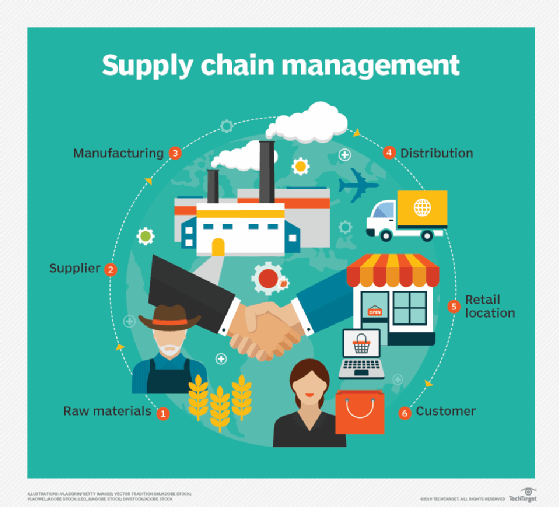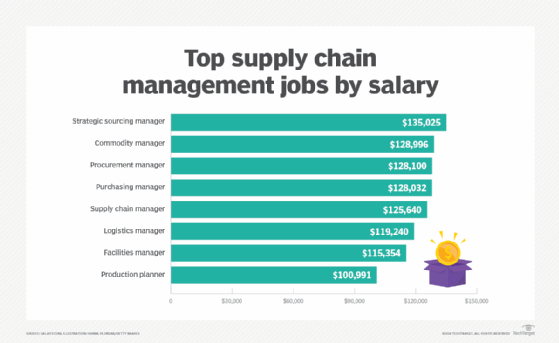8 of the top supply chain management career paths
Learn the most popular career paths in supply chain management, including logistics manager and supply chain manager, and the education required to secure those roles.
Supply chain management is a high-paying field with a wide range of job opportunities. However, those wishing to work in supply chain management must complete the required education and become familiar with the latest technology, particularly as AI and analytics change the field.
Supply chain management is the planning of a product's journey from initial sourcing and creation through distribution. Logistics oversees item storage and the journey of goods to customers and aims to deliver items quickly with minimum expenditure.
Supply chain professionals are crucial to any company that makes and sells products, as workers in the logistics and supply chain management fields ensure that customers receive goods and services when and where they want them. Consequently, the logistics industry is an important driver of economic growth and development and is particularly critical as omnichannel demands continue to change the supply chain landscape.
Why choose a career in supply chain management?
Various types of supply chain and logistics jobs exist at different levels, so those interested in supply chain management careers have a myriad of ways they can break into the profession.
This article is part of
Guide to supply chain management
Individuals can opt to work in areas such as logistics, production and facilities management. Many of the skills individuals learn for supply chain management are transferable to other fields as well, giving workers flexibility in their career paths.
Required educational background for supply chain management careers
The first step to starting a career in supply chain management is to earn a degree related to supply chain management or logistics. Although some people can begin their careers with an associate's degree, a bachelor's degree is typically the minimum amount of education an individual needs to work in the supply chain. Some colleges and universities offer specialized degrees in supply chain management, and individuals can also opt to complete a supply chain management certification.
Jobs in supply chain management require skills in areas such as project management and procurement, and they often require knowledge of technology such as ERP systems.

8 of the top supply chain management career paths
Specializations for supply chain management jobs include areas such as procurement and production. Review the top supply chain management careers, according to Salary.com, to decide which one might be right for you.
1. Production planner
Average salary $100,991
A production planner is responsible for planning production schedules and ensuring that the production process is carried out on budget and on time. Duties related to the production manager role might include the following:
- Create work schedules.
- Oversee production staff.
- Analyze production processes, and recommend strategies to improve those processes.
- Ensure equipment is working correctly and the required materials are available for production.
Educational background. Some of the bachelor's degrees held by production planners include industrial engineering and business management.
2. Facilities manager
Average salary $115,354
A facilities manager ensures that an organization's buildings meet the company's needs and all required standards. Here are some of a facility manager's specific duties:
- Supervise building, facilities and property maintenance.
- Manage building systems, and oversee facilities workers.
- Ensure facilities meet government regulations and environmental, health and security standards.
Educational background. Most facilities managers possess a bachelor's degree, with degree specializations such as business management, engineering or facility management.

3. Logistics manager
Average salary $119,240
A logistics manager plans and oversees logistics policies and goals. Here are some of a logistics manager's specific duties:
- Develop procedures for logistics management to improve product workflow and reduce costs.
- Negotiate shipping and supplier costs.
- Supervise transportation and storage of items, and control the flow of incoming materials and outgoing finished goods.
- Carry out the proper planning so customers get their products on time.
Educational background. Typically, a logistics manager needs a bachelor's degree in a field such as supply chain management or finance.
4. Supply chain manager
Average salary $125,640
A supply chain manager supervises the company's overall supply chain and logistics operations with the goal of increasing efficiency and productivity and reducing costs. Here are some responsibilities of the supply chain manager role:
- Work with managers from across the company to plan and execute the supply chain strategy.
- Manage and monitor the qualifications and performance of the company's vendors and suppliers to ensure they meet the organization's requirements.
- Gather data about the supply chain, and find areas for improvement.
Educational background. A supply chain manager typically holds at least a bachelor's degree in supply chain management or business administration.
5. Purchasing manager
Average salary $128,032
A purchasing manager is involved in aspects of an organization's operations, including comparing supplier costs and tracking supplier transactions. Here are some specific duties of the purchasing manager role:
- Create strategic purchasing processes, and manage purchasing.
- Oversee vendor and supplier relationships, and negotiate major contracts.
- Evaluate and analyze purchasing and pricing trends to forecast demand and attempt to reduce purchasing costs.
Educational background. Organizations often require a bachelor's degree in a field such as business or logistics.
6. Procurement manager
Average salary $128,100
A procurement manager is the main point of contact between a company and its suppliers. Specific duties a procurement manager might perform include the following:
- Identify and evaluate possible suppliers.
- Negotiate contracts with potential suppliers.
- Monitor suppliers' performance to ensure they are meeting contractual obligations.
- Monitor changes in the industry, and create forecasts to inform company strategies.
Educational background. Procurement managers must often hold a bachelor's degree, with some popular majors including supply management and business.
7. Commodity manager
Average salary $128,996
A commodity manager works on strategies for certain commodities. To succeed in this position, the commodity manager must possess an understanding of the local and global market, supplier sourcing and risk management. Here are some of a commodity manager's responsibilities:
- Ensure that the company is paying the optimum costs for commodities.
- Ensure that procurement helps to meet the company's business objectives.
- Work on vendor contracts.
Educational background. A commodity manager must possess a bachelor's degree in business or engineering, among other potential areas of concentration.
8. Strategic sourcing manager
Average salary $135,025
A strategic sourcing manager helps ensure that an organization's expenditures balance the need to be thrifty with the purchase of high-quality items. Here are some of the strategic sourcing manager's specific duties:
- Conduct research to drive the company's purchasing decisions and analyze new business opportunities.
- Negotiate prices with suppliers and vendors.
- Forecast future costs.
Educational background. Most organizations require that a strategic sourcing manager has, at a minimum, a bachelor's degree in a field such as business or finance. Some companies seek out candidates with master's degrees.
Editor's note: This article has been updated by TechTarget editors to reflect the current job market.







